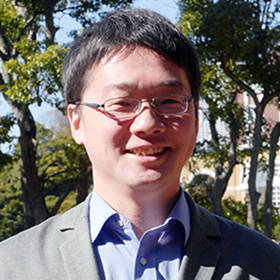We invited Yuki Sakurai, a member of the Association for Refugee Assistance (AAR JAPAN), to the Global Career Lecture for the 9th graders (third graders of middle school). He spoke regarding his activities with the association. He mainly talked about his experiences in Tajikistan and Zambia.

“I first thought about international cooperation when I was in the second grade of junior high school, after seeing the TV drama of Chinue Sugihara.” Mr. Sakurai was moved by Chinue Sugihara saving lots of lives and thought “I will get an international job in the future!” This familiar motive attracted the students’ attention.

Mr. Sakurai got interested in NGO activities after having the opportunity to hear stories from AAR JAPAN when he was a university student, but after graduation he got a job at the Nuclear Safety Research Association. His interest in international cooperation did not disappear though and he went on to work at AAR JAPAN.

AAR JAPAN works in five fields; emergency support, support for people with disabilities, countermeasures against landmines, countermeasures against infectious diseases, and enlightenment. In 1997, this organization received a Nobel Peace Prize as a major member of the ICBL, the Landmine Prohibited International Campaign.
Mr. Sakurai has been mainly engaged in “support for people with disabilities” from AAR’s five fields.

“All children and students should receive an education according to their own characteristics regardless of the presence or absence of disability, it is what ‘inclusive education’ is.”
Mr. Sakurai, who has been promoting “inclusive education” as part of support for people with disabilities in Tajikistan, aims to transform society to be more inclusive. He explained the current situation to the students illustrating with photos, images and stories.

Tajikistan was a country that originally formed the Soviet Union. In the Soviet Union at that time, disabled people who wanted to get an education were forced to live in a dormitory in the deep mountains and it was the only place for them.
In addition, as there was a maximum capacity in the dormitory, most disabled people were not able to be educated at all.

In Tajikistan, Mr. Sakurai trained school teachers about “education for people with disabilities” and talked to the community about the importance of educational activities.
“All right, I want to show a school right now.”
When he visited families with children with disabilities and persuaded their parents to let their children attend a special support school, the parents responded so immediately that he took them to a school nearby and enrolled the children there.

“The goal in supporting people with disabilities is not to change the system but to change consciousness. The important thing is that people with disabilities are with us. If you become a disabled person in the future, you will come to think of things like ‘I wish there were railings here’ when you are going up the stairs.”
Mr. Sakurai told students that it is the same as saying that a disability is a part of “personality” like being good at running, or being good at studying.

“It is the most important thing that each and every one of you is interested. If you are going to live with a disabled person, please do not settle for less and face them like a friend.”
The students felt Mr.Sakurai’s sincere and straightforward personality and the significance of supportive activities that seeped out from every single word from episodes helped them to receive the message clearly.

After the lecture, the question and answer session became a place for exchange of opinions between Ms. Sakurai and the students regarding a better way to change people’s consciousness. It was an opportunity for students to deepen their ideas and the answers he gave were deliberate and thoughtful.
Mr. Sakurai makes international contributions by acting on the feelings he embraced when he was a boy. From seeing that way of life, the students learned that each of their own thoughts and behaviors can create a “better society”.




